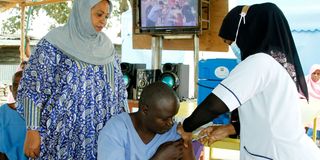WHO issues warning on increase in Covid-19 cases

A man receives the first dose of Covid-19 vaccine in Miritini, Mombasa County, on August 12, 2021. The country is witnessing a seventh wave, which will run up to early January.
As the end-of-year festivities begin, the World Health Organisation (WHO) has issued a warning about the rise in coronavirus cases.
The UN health agency in a statement said Africa has recorded an increase in Covid-19 cases in the last four weeks, adding that there is need for vigilance.
Africa began recording a rise in Covid-19 infections in late November.
The good thing is that the numbers are not as high as was the case in the same period in 2020 and last year, WHO said.
However, the continent recorded an increase in the number of coronavirus fatalities by 14 per cent.
The deaths were low by four per cent compared to the previous year.
Also Read: Covid-19 seventh wave is here
Even with the increase in numbers, hospitalisation and severe cases remain very low, meaning there is no significant strain on hospitals.
Despite the recent increase in the number of cases, there is hope of Africa being spared the challenges of the last two years when rising figures and deaths hit ordinary life and caused devastation in families and communities.
“We must remain vigilant, increase vaccination coverage and be ready to adopt more stringent preventive measures if necessary,” WHO Regional Director for Africa Matshidiso Moeti said.
“Investments made in the Covid-19 fight in the last three years are paying off, with the region better able to cope with the virus and its health emergency response systems bolstered. We should not go back to where we were two years ago.”
Kenya started registering an increase in the number of Covid-19 cases early last month.
The country witnessed the number going up, with severe cases and deaths remaining low.
The number has since gone down. Yesterday, the country recorded 57 cases out of a sample size of 1,040 tested.
The country is not off the hook yet, according to a wave projection by the Lake Region Economic Bloc (LREB).
Kenya is witnessing a seventh Covid-19 wave, which will run up to early January.
Also Read: Covid-19 is back, you need to take care
From the projection model, approximately 23,040 patients will be hospitalised. Asymptomatic cases will be 276,480.
The country will lose 50 citizens to the virus by the end of the wave.
According to the modelling, the wave will last 63 days and will have a low peak intensity with likely 1,500 daily cases.
Prof Shem Sam Otoi, the Covid-19 programmes coordinator for the LREB model, said the country will record its peak between mid-December and early January.
“We are not yet at the peak of this seventh wave and with the festivities approaching, we are likely to record more cases,” Prof Otoi said.
“While on holiday, we must be aware that the virus is here. Observe the measures put in place to fight it.”
Testing in the country is minimal. The samples being tested are for travellers and patients.
About 1,000 samples were tested on Thursday, up from more than 10,000.
Prof Otoi urged the Ministry of Health to increase the coronavirus testing and vaccination capacity.
About 23,013,694 vaccines had been administered across the country as of Thursday.
Of these, 18,426,561 doses were administered to people 18 years old and above.
Some 2.8 million were given to those between 12 and 17 while 1.8 million are booster doses.
The proportion of adults fully vaccinated stands at 39 per cent.
The government is working towards vaccinating a targeted population of 27,246,033 by end of December, according to the ministry.
As part of a move to integrate Covid-19 into routine health services, WHO recommends that countries adopt testing strategies that focus on detecting new cases, particularly in vulnerable populations.
Only 26 per cent of Africans are fully vaccinated against Covid-19.
While Cameroon and other countries carry out mass vaccination drives, others have begun integrating coronavirus vaccination into routine immunisation and primary health services.
“As we move into 2023, it is time to bring Covid-19 out of an emergency response mode and integrate it into routine health care,” Dr Moeti said.





